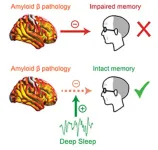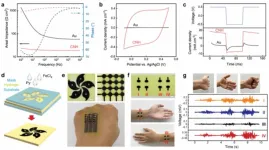(Press-News.org) A Swedish study of nearly 3 million women published by The BMJ today finds no evidence of an increased risk of menstrual changes after covid-19 vaccination.
Weak and inconsistent associations were found between covid-19 vaccination and contact with healthcare for postmenopausal bleeding and were even less consistent for menstrual disturbance and premenstrual bleeding.
These findings do not provide any substantial support for a causal association between covid-19 vaccination and diagnoses related to menstrual or bleeding disorders, say the researchers.
Many women have reported changes to their periods after a covid-19 vaccination, such as the number of days they bleed and the heaviness of the flow. Self-reporting may capture events that normally would not result in a healthcare contact but may still be sufficiently disturbing to be relevant for the affected women. But calculating the strength of a potential association based on self reports can be unreliable.
To address this, researchers in Sweden drew on high quality health registry data to evaluate the risks of menstrual disturbance and bleeding after covid-19 vaccination in 2,946,448 women aged 12-74 years from December 2020 to February 2022.
Contact with healthcare included primary care visits, specialist outpatient visits, and days of hospital stay related to menstrual disturbance or bleeding before or after menopause.
Risks were assessed by vaccine (Pfizer-BioNTech, Moderna, or Oxford-AstraZeneca) and dose (unvaccinated and first, second, and third dose) over two time windows (1-7 days, considered the control period, and 8-90 days).
In the main analysis, more than 2.5 million (88%) of women received at least one covid-19 vaccination and over 1.6 million (64%) of vaccinated women received three doses during the study period.
The highest risks for bleeding in postmenopausal women were seen after the third dose in the 1-7 days risk window (28%) and in the 8-90 days risk window (25%).
Adjusting for socioeconomic factors, previous healthcare use, and for several specific medical conditions had only a modest effect on these results.
Analyses of individual vaccines and risk of postmenopausal bleeding suggested a 23-33% increased risk after 8-90 days with Pfizer-BioNTech, and Moderna after the third dose, but a less clear association with Oxford-AstraZeneca.
In premenopausal women, weak associations were found for menstrual disturbance or bleeding after vaccination with any dose (13% or 8% after 1-7 days and 6% or 1% after 8-90 days, respectively). However, adjusting for other factors almost completely removed these weak associations, suggesting that a causal effect is unlikely.
These are observational findings and the authors point to several limitations, including the fact that the time between onset, start of symptoms, and date of healthcare contact might be considerable, making the interpretation of effect of different risk windows challenging.
But this was a large study with near complete follow-up, using mandatory data from nationwide registers.
As such, they say: “We observed weak and inconsistent associations between SARS-CoV-2 vaccination and healthcare contacts for postmenopausal bleeding, and even less consistent for menstrual disturbance, and premenstrual bleeding.”
They add: “These findings do not provide any substantial support for a causal association between SARS-CoV-2 vaccination and healthcare contacts related to menstrual or bleeding disorders.”
END
New study finds no increased risk of menstrual changes after COVID-19 vaccination
Results from nearly 3 million women suggest a causal effect is unlikely, say experts
2023-05-04
ELSE PRESS RELEASES FROM THIS DATE:
TSIM introduces online training course for successfully implementing sustainable telehealth services
2023-05-04
The Telehealth Service Implementation Model (TSIM) is set to launch a brand-new online training course for telehealth leaders and teams. TSIM originated at the Medical University of South Carolina (MUSC), stemming from the successful and groundbreaking work of its successful telehealth team. The MUSC Health Center for Telehealth is one of only two federally designated National Telehealth Centers of Excellence in the country.
All-encompassing in nature, TSIM’s structured framework facilitates the development, implementation and optimization of telehealth services. The pioneers of this unique model aimed to share their knowledge and telehealth best practices with other ...
Durham University receives £9m Wellcome award to transform humanities’ contribution to health research
2023-05-04
-With pictures-
Durham University researchers have been awarded the largest grant ever made by the Wellcome Trust for humanities research.
The £9 million award was announced today (4 May 2023) and will fund a new Discovery Research Platform for Medical Humanities (DRP-MH).
The Discovery Research Platform for Medical Humanities will bring the stories and perspectives of people with lived experience of complex health conditions to the forefront of health research.
The Platform will involve people with lived experience and people from marginalised communities as ...
Severe mental illness linked to low attendance at cancer screening
2023-05-04
People with severe mental illness are less likely to attend cancer screening compared to those who do not have such conditions, according to new research from the University of Surrey and the Office for Health Improvement and Disparities (OHID) at the Department of Health and Social Care.
Funded by OHID and NHS England, with support from Cancer Research UK, the study found disparity in attendance at cancer screening in people with severe mental illness, with the most pronounced disparities being observed for those diagnosed with schizophrenia, followed by those diagnosed with other psychoses and bipolar disorder.
The ...
Deep sleep may mitigate Alzheimer’s memory loss, Berkeley research shows
2023-05-04
A deep slumber might help buffer against memory loss for older adults facing a heightened burden of Alzheimer’s disease, new research from the University of California, Berkeley, suggests.
Deep sleep, also known as non-REM slow-wave sleep, can act as a “cognitive reserve factor” that may increase resilience against a protein in the brain called beta-amyloid that is linked to memory loss caused by dementia. Disrupted sleep has previously been associated with faster accumulation of beta-amyloid protein in the brain. However, the new ...
HKU Mechanical Engineering team develops electroconductive hydrogel for biomedical applications
2023-05-04
Synthetic hydrogels show great promise in tissue repair, drug delivery, medical implants, and many other applications. Hydrogels functionalized with electrically conductive components can be used in bioelectronic devices for cardiac or neural interfaces, for applications such as neural prosthetics, cardiac patches, and electronic skin.
A research team led by Dr Lizhi Xu of the Department of Mechanical Engineering in the Faculty of Engineering at the University of Hong Kong (HKU) has recently developed a new type of electroconductive hydrogels with outstanding mechanical strength and manufacturability, creating ...
New guidance: antibiotics should be halted upon closure of incisions
2023-05-04
ARLINGTON, Va. (May 4, 2023) — Antibiotics administered before and during surgery should be discontinued immediately after a patient’s incision is closed, according to updated recommendations for preventing surgical site infections. Experts found no evidence that continuing antibiotics after a patient’s incision has been closed, even if it has drains, prevents surgical site infections. Continuing antibiotics does increase the patient’s risk of C. difficile infection, which causes severe diarrhea, and ...
Red flags indicate risk for early-onset colorectal cancer
2023-05-04
Researchers at Washington University School of Medicine in St. Louis have identified four important signs and symptoms that signal an elevated risk of early-onset colorectal cancer. These red flags may be key to earlier detection and diagnosis of early-onset colorectal cancer among younger adults. The number of young adults with colorectal cancer has nearly doubled in recent years.
Studying de-identified health insurance data on more than 5,000 patients with early-onset colorectal cancer — cancer that occurs before a person turns 50 — the researchers found that in the period between ...
Reviving exhausted T cells to tackle immunotherapy-resistant cancers
2023-05-04
LA JOLLA, CALIF. – May 03, 2023 – When the cells of our immune system are under constant stress due to cancer or other chronic diseases, the T cells of the immune system shut down in a process called T cell exhaustion. Without active T cells, which kill tumor cells, it’s impossible for our bodies to fight back against cancer. One of the biggest goals of immunotherapy is to reverse T cell exhaustion to boost the immune system’s ability to destroy cancerous cells.
Researchers at Sanford Burnham Prebys studying melanoma have found a new way to make this ...
MD Anderson researchers Helen Piwnica-Worms and Richard Wood elected to National Academy of Sciences
2023-05-03
HOUSTON ― Two researchers from The University of Texas MD Anderson Cancer Center have been elected to the prestigious National Academy of Sciences (NAS). Helen Piwnica-Worms, Ph.D., professor of Experimental Radiation Oncology, and Richard Wood, Ph.D., professor of Epigenetics and Molecular Carcinogenesis, are recognized for their respective contributions to advancing our understanding of cancer genetics, biochemistry and cell biology.
Piwnica-Worms and Wood are among 120 new members ...
Purdue startup Aerovy Mobility develops cloud software to support infrastructure for electric aircraft
2023-05-03
WEST LAFAYETTE, Ind. – The advanced air mobility sector, which includes electric-powered urban and regional aircraft, may become a $1.5 trillion market by 2040. A new Purdue University-connected startup could benefit airport and vertiport operators and real estate developers looking to establish advanced air mobility technology at existing and potential sites.
Purdue University postgraduate students have launched Aerovy Mobility, a startup company that commercializes cloud-based software solutions to plan and operate infrastructure ...
LAST 30 PRESS RELEASES:
How much sleep do teens get? Six-seven hours.
Patients regain weight rapidly after stopping weight loss drugs – but still keep off a quarter of weight lost
GLP-1 diabetes drugs linked to reduced risk of addiction and substance-related death
Councils face industry legal threats for campaigns warning against wood burning stoves
GLP-1 medications get at the heart of addiction: study
Global trauma study highlights shared learning as interest in whole blood resurges
Almost a third of Gen Z men agree a wife should obey her husband
Trapping light on thermal photodetectors shatters speed records
New review highlights the future of tubular solid oxide fuel cells for clean energy systems
Pig farm ammonia pollution may indirectly accelerate climate warming, new study finds
Modified biochar helps compost retain nitrogen and build richer soil organic matter
First gene regulation clinical trials for epilepsy show promising results
Life-changing drug identified for children with rare epilepsy
Husker researchers collaborate to explore fear of spiders
Mayo Clinic researchers discover hidden brain map that may improve epilepsy care
NYCST announces Round 2 Awards for space technology projects
How the Dobbs decision and abortion restrictions changed where medical students apply to residency programs
Microwave frying can help lower oil content for healthier French fries
In MS, wearable sensors may help identify people at risk of worsening disability
Study: Football associated with nearly one in five brain injuries in youth sports
Machine-learning immune-system analysis study may hold clues to personalized medicine
A promising potential therapeutic strategy for Rett syndrome
How time changes impact public sentiment in the U.S.
Analysis of charred food in pot reveals that prehistoric Europeans had surprisingly complex cuisines
As a whole, LGB+ workers in the NHS do not experience pay gaps compared to their heterosexual colleagues
How cocaine rewires the brain to drive relapse
Mosquito monitoring through sound - implications for AI species recognition
UCLA researchers engineer CAR-T cells to target hard-to-treat solid tumors
New study reveals asynchronous land–ocean responses to ancient ocean anoxia
Ctenophore research points to earlier origins of brain-like structures
[Press-News.org] New study finds no increased risk of menstrual changes after COVID-19 vaccinationResults from nearly 3 million women suggest a causal effect is unlikely, say experts






